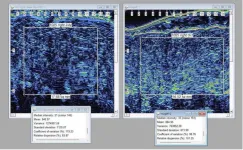(Press-News.org) Exploring diverse ancestry is a critical factor in furthering medical research.
A new study published in Nature Genetics from researchers in the Department of Biomedical Informatics (DBMI) at the University of Colorado School of Medicine, in partnership with the University of California San Francisco and Stanford University, is the largest of its kind that focuses on ancestry correlations with biomedical traits and the first study to examine the role of genetic variants across diverse ancestries in regulating gene expression.
“We’re trying to understand how genetic variability around the world allows us to gain a deeper understanding of the relationship between genetics and RNA levels and then protein levels and physiology,” says DBMI associate professor and study co-senior author Chris Gignoux, PhD. “The genome and gene expression each on their own only tells us so much. Having these layers coming together helps us a lot more.”
Gignoux describes the genetic control of gene expression as a dial that controls the amount of the gene that gets transcribed into RNA and protein levels, ultimately impacting function in various ways.
The study analyzed whole genome and RNA sequencing from African American and Latino children. Researchers say their findings demonstrate the importance of measuring gene expression across multiple populations because those gene expressions can vary greatly depending on ancestry and enable new discoveries that may also reduce health care disparities for historically underrepresented populations.
Gignoux’s lab used data from The National Heart, Lung, and Blood Institute-funded Trans-Omics for Precision Medicine (TOPMed) consortium and the National Human Genome Research Institute-funded Population Architecture using Genomics and Epidemiology (PAGE) Study. They analyzed whole genome and RNA sequencing data from 2,733 African American and Hispanic/Latino children, exploring ancestry and heterozygosity-related differences in the genetic architecture of whole blood gene expression.
“The ultimate goal was that we learn by looking at gene expression patterns in populations that came from the same ethnic group,” Gignoux explains. “Individuals from across Latin America do not reflect one homogeneous population, so that was part of the reason why it was important to not just look at Hispanics in one group, but to highlight what we can learn from studying Mexican Americans and Puerto Ricans, specifically. We’re able to leverage some of that diversity to understand some of these patterns.”
Because ethnicity is a sociopolitical identity, understanding the relationship between genetics and ancestry is quite complex and can vary greatly between individuals. This is true even within certain populations such as individuals of Puerto Rican descent.
Historically, there’s been a deficit in genetics research focused on people of non-European descent, but knowing more about the relationship between genetic variability and gene expression can inform deeper research into many different health issues.
That’s been proven true in examples such as the medical community’s knowledge of heart attacks, which for decades only focused on men. With more research, it became apparent that risk factors and symptoms look much different in women.
Without studying diverse populations, it’s nearly impossible to know a disease might present in another group of people. The work done by Gignoux and his fellow researchers, including researchers from the various communities represented, may help inform more discoveries that are significant to diverse populations, just like identifying different risk factors women face with heart attacks.
“We're not going to know what we don't know unless we look, and that has the potential to impact how we think about individuals’ risk factors for a number of different conditions and traits,” Gignoux says. “It's also important to look in the right kind of ways and develop the methodologies so that we can leverage these kinds of diversity-focused efforts. The hope is that as these kinds of initiatives move forward in genetic and non-genetic disciplines there's an opportunity to improve our understanding of biomedical traits for anyone who walks into the clinic.”
END
CU researchers weave deeper understanding of diverse ancestry and gene expression
Novel research from the Department of Biomedical Informatics examines the relationship between complex traits and non-European ancestry.
2023-05-25
ELSE PRESS RELEASES FROM THIS DATE:
Does body contouring increase long-term weight loss after bariatric surgery? New findings
2023-05-25
May 25, 2023 – For patients with massive weight loss after bariatric surgery, subsequent body contouring to remove excess skin is not itself associated with long-term weight loss, reports a study in the June issue of Plastic and Reconstructive Surgery®, the official medical journal of the American Society of Plastic Surgeons (ASPS). The journal is published in the Lippincott portfolio by Wolters Kluwer.
"In contrast to previous studies, we found that body contouring ...
Epigenetic mechanisms activated by GHK-Cu increase skin collagen density in clinical trial
2023-05-25
Skin loses collagen and elastin and becomes progressively thinner with age leading to wrinkles, so reversing this age-related loss of skin density is the holy grail of anti-aging treatments. One compound capable of doing that is the naturally occurring peptide GHK-Cu (GHK from glycyl-L-histidyl-L-lysine bound to a copper ion), which affects 31.2% of the human genes by either activating or deactivating them (based on a criterion of a reduction or increment in gene activity of more than 50%), meaning that it works by ...
Scientists use AI to find promising new antibiotic to fight evasive hospital superbug
2023-05-25
Attention editors: Embargoed by the journal Nature Chemical Biology until Thursday, May 25 at 11 a.m. easter
Hamilton, ON, May 25, 2023 – Scientists at McMaster University and the Massachusetts Institute of Technology have used artificial intelligence to discover a new antibiotic which could be used to fight a deadly, drug-resistant pathogen that strikes vulnerable hospital patients.
The process they used could also speed the discovery of other antibiotics to treat many other challenging ...
A metabolic process in cancer cells could unlock a possible treatment for glioblastoma
2023-05-25
A study led by researchers at the UCLA Jonsson Comprehensive Cancer Center has found that targeting a metabolic process in people with a specific genetic mutation could help treat glioblastoma, an aggressive brain cancer.
The genetic alteration — a deletion in a gene called CDKN2A — is present in about 60% of people who have glioblastoma. The mutation causes changes in the way lipids are distributed in cancer cells, which in turn makes the cancer cells vulnerable to being destroyed. The ...
Can sugar and fat influence immune cell responses?
2023-05-25
LA JOLLA, CA—A population of unconventional white blood cells has recently captured the attention of immunologists and clinicians alike. Unlike conventional T cells, which circulate throughout the body in our blood, mucosal-associated invariant T (MAIT) cells are largely found in tissues where they provide immune protection against a broad range of diseases.
MAIT cells are highly abundant in humans. Although they make up only 2 percent of the lymphocytes in blood, MAIT cells account for 10 to 40 percent of lymphocytes in the liver, and they are common in tissues such as lungs. Still, much about MAIT cell biology and clinical function remains unknown.
In ...
County-level maternal vulnerability and preterm birth
2023-05-25
About The Study: The findings of this study using data for 3.6 million births suggest that the Maternal Vulnerability Index (MVI), a novel county-level index designed to quantify maternal vulnerability to adverse health outcomes, was associated with preterm birth even after adjustment for individual-level confounders. The MVI is a useful measure for county-level preterm birth risk that may have policy implications for counties working to lower preterm rates and improve perinatal outcomes.
Authors: Sara C. Handley, M.D., M.S.C.E., Children’s Hospital of Philadelphia, is the corresponding author.
To ...
Deep learning for detection and symptom severity assessment of autism spectrum disorder
2023-05-25
About The Study: In this diagnostic study of 45 children with autism spectrum disorder (ASD) and 50 with typical development, a deep learning system trained on videos acquired using a joint attention–eliciting protocol for classifying ASD versus typical development and predicting ASD symptom severity showed high predictive performance. This new artificial intelligence–assisted approach based predictions on participants’ behavioral responses triggered by social cues. The findings suggest that this method may allow digital measurement of joint attention; however, follow-up studies are necessary for further validation.
Authors: Yu ...
Using AI, scientists find a drug that could combat drug-resistant infections
2023-05-25
CAMBRIDGE, MA -- Using an artificial intelligence algorithm, researchers at MIT and McMaster University have identified a new antibiotic that can kill a type of bacteria that is responsible for many drug-resistant infections.
If developed for use in patients, the drug could help to combat Acinetobacter baumannii, a species of bacteria that is often found in hospitals and can lead to pneumonia, meningitis, and other serious infections. The microbe is also a leading cause of infections in wounded soldiers in Iraq and Afghanistan.
“Acinetobacter can survive on hospital doorknobs and equipment ...
Monkey model offers clues for potential widespread HIV cure in people
2023-05-25
PORTLAND, Oregon -- New animal research is helping explain why at least five people have become HIV-free after receiving a stem cell transplant. The study’s insights may bring scientists closer to developing what they hope will become a widespread cure for the virus that causes AIDS, which has infected about 38 million people worldwide.
Published in the journal Immunity, the Oregon Health & Science University-led study describes how two nonhuman primates were cured of the monkey form of HIV after receiving a stem cell transplant. ...
OU professor leading research for next steps in monitoring bat coronaviruses
2023-05-25
Since the emergence of SARS in 2002, coronaviruses have been recognized as potential pandemic threats. This emergence highlights a need for evidence-based strategies to monitor bat coronaviruses. Daniel Becker, Ph.D., a researcher at the University of Oklahoma, is collaborating with other scientists nationwide to determine directions for future research.
Becker, an OU assistant professor of biology, was the senior author of a paper published in Nature Microbiology. The study’s lead author was Lily Cohen, a medical student at the Icahn ...
LAST 30 PRESS RELEASES:
Trapping light on thermal photodetectors shatters speed records
New review highlights the future of tubular solid oxide fuel cells for clean energy systems
Pig farm ammonia pollution may indirectly accelerate climate warming, new study finds
Modified biochar helps compost retain nitrogen and build richer soil organic matter
First gene regulation clinical trials for epilepsy show promising results
Life-changing drug identified for children with rare epilepsy
Husker researchers collaborate to explore fear of spiders
Mayo Clinic researchers discover hidden brain map that may improve epilepsy care
NYCST announces Round 2 Awards for space technology projects
How the Dobbs decision and abortion restrictions changed where medical students apply to residency programs
Microwave frying can help lower oil content for healthier French fries
In MS, wearable sensors may help identify people at risk of worsening disability
Study: Football associated with nearly one in five brain injuries in youth sports
Machine-learning immune-system analysis study may hold clues to personalized medicine
A promising potential therapeutic strategy for Rett syndrome
How time changes impact public sentiment in the U.S.
Analysis of charred food in pot reveals that prehistoric Europeans had surprisingly complex cuisines
As a whole, LGB+ workers in the NHS do not experience pay gaps compared to their heterosexual colleagues
How cocaine rewires the brain to drive relapse
Mosquito monitoring through sound - implications for AI species recognition
UCLA researchers engineer CAR-T cells to target hard-to-treat solid tumors
New study reveals asynchronous land–ocean responses to ancient ocean anoxia
Ctenophore research points to earlier origins of brain-like structures
Tibet ASγ experiment sheds new light on cosmic rays acceleration and propagation in Milky Way
AI-based liquid biopsy may detect liver fibrosis, cirrhosis and chronic disease signals
Hope for Rett syndrome: New research may unlock treatment pathway for rare disorder with no cure
How some skills become second nature
SFU study sheds light on clotting risks for female astronauts
UC Irvine chemists shed light on how age-related cataracts may begin
Machine learning reveals Raman signatures of liquid-like ion conduction in solid electrolytes
[Press-News.org] CU researchers weave deeper understanding of diverse ancestry and gene expressionNovel research from the Department of Biomedical Informatics examines the relationship between complex traits and non-European ancestry.



